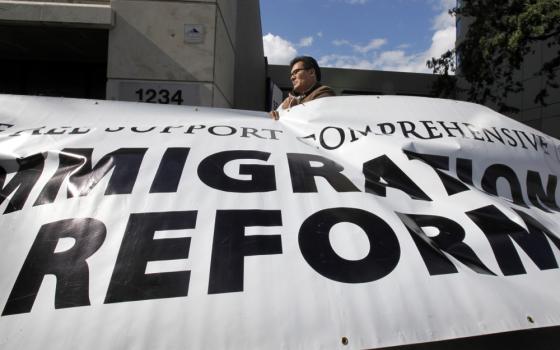Editor's note 7/18/14: Broken hyperlinks have been fixed.
7/21/14: Catholic News Service has filed a story with more suggestions for advocacy and assistance.
When the pressures of poverty and violence become too heavy, people risk moving to someplace they perceive to be – or hope will be – better. Moving itself is risky. What awaits you when you leave the Philippines for a Middle Eastern overseas work position? What becomes of your identity when you are living in a refugee camp in Jordan, South Sudan, Kenya, for months and sometimes years on end?
There will be new land, new language, new food – if there is enough food – and the near-certain fact of human nature that whoever is already occupying that land will feel threatened on some level. You have come for their jobs. Your tent city is costing their government millions. Your sheer numbers are overwhelming.
Global Sisters Report has posted numerous stories about these realities, and we know that your feelings are ones of compassion, not revulsion: Catholic social justice wanting to be put into action.
This week, Sr. Joan Brown alludes to the pressures of poverty and how the environment relates to the wave of Western hemisphere migration in her column.
Sr. Janet Gildea gave us an update about her community and others who are working at the U.S.-Mexico border to help the unaccompanied minors and other immigrants surging now from Central America. Since her first report in June, we have heard from many of you, via email and on social media, saying you want to help:
“I don’t feel right sitting back and watching it all happen.” “Can I volunteer?” “Where can I send assistance?” “I am offering my home.”
Even if you are not at the border, there are things you can do to share your compassion and to make meaningful differences. There are short-term and long-term needs.
The Annunciation House, Columban mission center and other organizations Sr. Janet has worked with are all linked in those columns, should you wish to contact them and ask what they in particular need most. Guessing from advice that comes whenever there is a natural disaster, sending a lot of “stuff” is probably not the best choice. While clothes and food are needed always, organizations usually have plenty of local sources and limited time to manage receiving packages or sorting through large loads of donations. Money is often the best option for sharing your resources.
But, I encourage you, ask them.
If you are a regular Global Sisters Report reader, you know about NETWORK, the D.C.-based social justice lobby that launched Nuns on the Bus. They recently sent out an email to their subscribers addressing the same questions GSR has heard from you, and they have some of the same ideas we did, so we are passing them along, with a few changes in brackets:
Advocate for them with Congress
Ask for additional funding for the Office of Refugee Resettlement, and insist that we protect these children. Share these alerts with your friends, and ask them to take action as well.
Schedule a lobby visit [or call/write]
[You can visit with] your member of Congress during the August recess to talk more about this issue. [You can always write or call their D.C. offices now, before they head to your home district, too. The issue is larger than just this wave of people seeking new homes.]
Seek out local opportunities
[Around the country] organizations like Catholic Charities, the San Diego Immigrant Rights Consortium and other groups [are] working with unaccompanied minors or other refugees and asylum seekers to volunteer or provide much-needed donations of items to provide for children and families. [Find out what your community is doing by contacting your local Catholic Charities group, especially as the children are released to families and friends far from the border and will wait an average of a year before getting their status hearing.]
NETWORK also encourages you to share your experiences working with vulnerable populations and the unaccompanied minors so they can share stories with Congress and the Administration. You can email them at networkupdate@networklobby.org.
Finally, this is a detailed PDF from the USCCB Committee on Migration with links to organizations, shelter requirements and information about policy and long-term needs.
It's a lot to read, but I hope you will find something in all the suggestions that fits your abilities, location and desire to help.
[Tracy Abeln is assistant managing editor for Global Sisters Report.]

